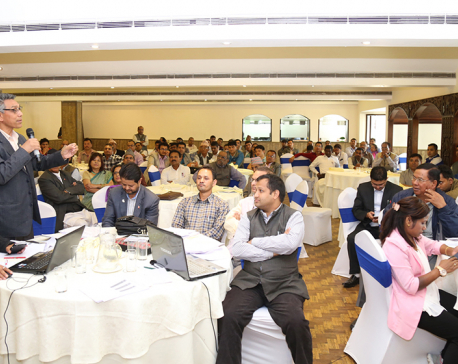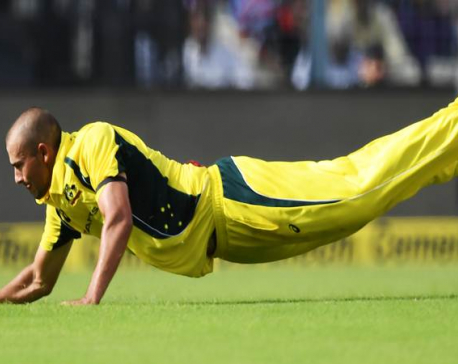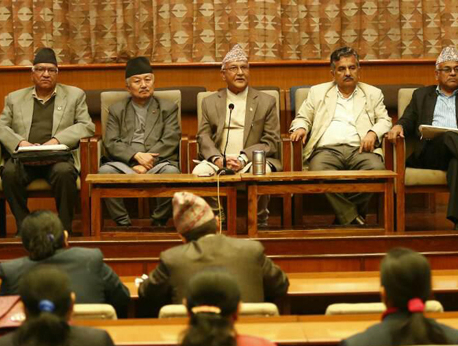
OR
Local election rules
The Election Commission is under immense pressure these days. It has been working on a war footing ever since Prime Minister Prime Minister Pushpa Kamal Dahal on February 20 announced local election, to be held on May 14. In effect, the commission was given just 85 days to prepare, the shortest time that has been made available to the commission to prepare for any election since the restoration of democracy in 1990. Following the prime minister’s announcement, the commission should have immediately imposed its election code of conduct in order to ensure free and fair election. But it delayed the code by a week, allowing the Congress-Maoist coalition government to transfer senior officials of Nepal Police and Armed Police Force as well as 35 chief districts officials. Such last-minute transfers were clearly meant at influencing the election, and had the code of conduct been imposed at the time they would have been illegal. Now, the Home Ministry, headed by senior Nepali Congress leader Bimalendra Nidhi, is seeking permission from the commission for transfer of 300 more senior police officials prior to May 14. The commission should reject the request.
But perhaps it won’t. Had Chief Election Commissioner Ayodhee Prasad Yadav been firm about not compromising the May 14 election in any way, he would not have delayed imposing the code of conduct by a week. But the political parties in the government clearly believe that he can be pushed around, coerced and cajoled into relaxing electoral rules to their advantage. Yadav should show more spine. He can learn a lot from his two immediate predecessors, Bhojraj Pokharel and Neelkantha Upreti, who were responsible for the conduct of the first and second Constituent Assembly election respectively. Both of them were gentle and soft-spoken, but when it came to disciplining the political parties that were trying to bend electoral rules, they were ruthless. Ministers and MPs would be routinely summoned and warned of their questionable conduct. They were as quick to shoot down any questionable requests from the government and refused to be cowed down by higher authorities. In comparison, Yadav is proving to a weak chief commissioner, and rather amenable to political pressure.
The ruling parties, chiefly Congress and the Maoists, are also giving a poor account of themselves. It seems they want election only because they are in a position to influence it. PM Dahal, as the government head, has also been unable to stamp his authority, as his coalition partners openly bicker and violate the election code of conduct. Even a more resolute chief commissioner would have found it difficult to work with the kind of fractured government that Dahal currently leads. With many forces arrayed against the May 14 vote, at least the prime minister should be committed to timely and free and fair election. This entails disciplining his errant coalition partners and creating a condition for the election commission to work independently. The prime minister’s flexibility should be in display in negotiations with Madheshi parties. On election, he should be firm as a rock.
You May Like This

CEC Yadav warns of scraping candidacy of poll code violators
KATHMANDU, Oct 8: Chief Election Commissioner (CEC) Ayodhee Prasad Yadav has warned of scrapping the candidacy of those candidates who... Read More...

Agar out of remainder of India tour with broken finger
MELBOURNE, Sept 25: Australia spinner Ashton Agar has been ruled out of the last two one-day internationals in India after... Read More...

Maintain election code of conduct: CPN-UML
KATHMANDU, April 23: The main opposition CPN-UML has urged the government to maintain the election code of conduct. ... Read More...





Just In
- MoHP cautions docs working in govt hospitals not to work in private ones
- Over 400,000 tourists visited Mustang by road last year
- 19 hydropower projects to be showcased at investment summit
- Global oil and gold prices surge as Israel retaliates against Iran
- Sajha Yatayat cancels CEO appointment process for lack of candidates
- Govt padlocks Nepal Scouts’ property illegally occupied by NC lawmaker Deepak Khadka
- FWEAN meets with President Paudel to solicit support for women entrepreneurship
- Koshi provincial assembly passes resolution motion calling for special session by majority votes






_20220508065243.jpg)






Leave A Comment